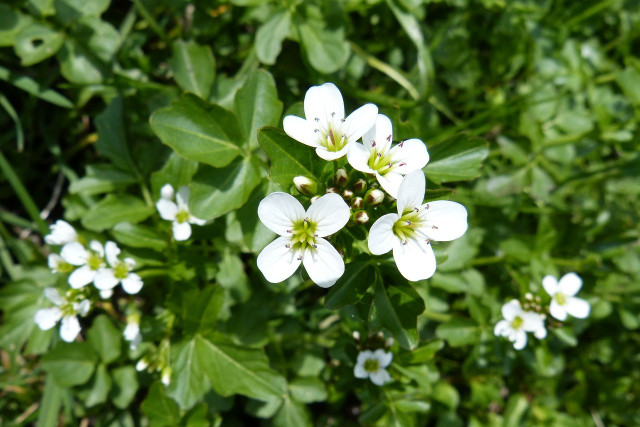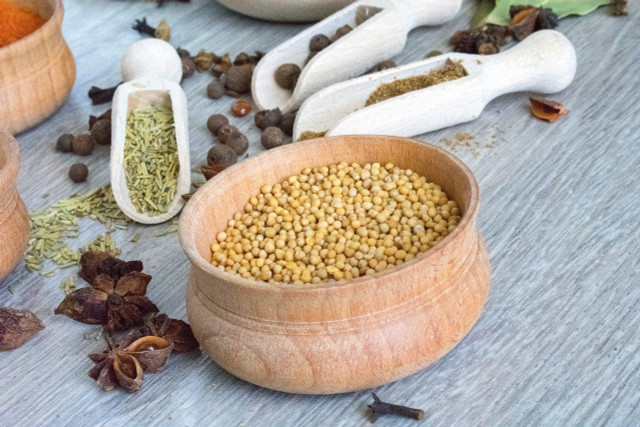
Using hot mustard against heartburn sounds contradictory at first. The oils contained in mustard are said to have a soothing effect on the burning esophagus. You can find out more about this home remedy here.
Mustard is characterized above all by its spiciness – which is why for many people it is not necessarily the product of choice to combat a burning sensation in the esophagus. Nevertheless, mustard for heartburn is a tried and tested home remedy. Although there is much to be said for its effectiveness, this remedy should be used with a little caution. You can read how you can use mustard against heartburn and what medical research says about it in this article.
What is heartburn and how does it occur?

(Photo: CC0 / Pixabay / naturalherbsclinic)
Heartburn occurs when stomach acid enters the esophagus. There it causes an unpleasant burning sensation that can usually be felt in the breastbone region. The medical term for heartburn is reflux. Acid belching can also be part of the symptoms.
There are various causes of heartburn:
- Diet is often to blame and the symptoms occur, for example, after heavy or fatty meals.
- They can also be triggered by fruit acid, coffee or alcohol.
- Smokers also suffer from heartburn more often.
- However, there can also be medical reasons for reflux, for example a disorder of the sphincter at the entrance to the stomach or inflammation of the gastric mucosa. If heartburn is particularly severe, doctors speak of reflux disease.
If you suffer from regular and persistent heartburn, you should therefore seek medical advice as a precaution to get to the bottom of the cause. Occasional heartburn, on the other hand, is usually not a cause for concern and can often be combated with simple home remedies.
Mustard for heartburn: This is the research

(Photo: CC0 / Pixabay / alsen)
Mustard contains mustard oils, which also add spiciness to other foods such as horseradish or radishes. These oils are said to have various health effects. Above all, they are said to have antibacterial, antiviral and anti-inflammatory effects. They are therefore even considered a natural alternative to antibiotics: According to the University of Bonn, a combination of mustard oils from watercress and horseradish is particularly helpful for acute bladder infections and respiratory infections.
There are now several studies on the effectiveness of mustard oils for urinary tract infections. Most of the time, these studies relate to foods containing mustard oil, such as cress and horseradish. There is currently no specific research into the medical effects of mustard itself.
The effect of mustard against heartburn has not yet been medically proven. A possible explanation could be that mustard oils bind stomach acid and prevent it from reaching the esophagus. The Heartburn Knowledge portal, which is operated online by the German Society for Health Information, offers more detailed information.
According to this source, mustard is even able to neutralize stomach acid to a certain extent due to its alkaline properties. In addition, the oils it contains are said to soothe the stomach lining and stimulate digestion. However, these assumptions are expressly not based on scientific studies.
This is how you use mustard against heartburn

(Photo: CC0 / Pixabay / Enotovyj)
You can use mustard either in the form of mustard seeds or as ready-made mustard. Heartburn Knowledge recommends taking mustard seeds before a meal and mustard paste afterward. However, the reason for the distinction is unclear. According to heartburn knowledge, it is important not to chew the mustard seeds but to swallow them whole. The mustard oils should only be released in the stomach and have a particularly good effect. Against this background, it has not been proven whether already processed mustard has a weaker effect. Incidentally, the shells of the mustard seeds are not digestible; the body excretes them. You should ideally consume ready-made mustard cold, as heat destroys the health-promoting substances it contains.
As far as the amount is concerned, you should approach it slowly and first check how you personally react to the home remedy. In the worst case scenario, mustard can even make the symptoms worse. If you tolerate it well, you can take one to two teaspoons of mustard several times a day to combat heartburn, for example with every meal.
It is also not possible to say clearly which type of mustard works best against heartburn and may vary from person to person. Spicy mustard can stimulate the production of stomach acid and thus increase reflux. On the other hand, according to heartburn knowledge, the hot version usually contains more black mustard seeds than medium-hot mustard. These in turn are richer in the ingredients that are said to have a relieving effect on heartburn. After taking mustard – regardless of type – it is also recommended to drink plenty of water. This is a good remedy for heartburn anyway.
Read more on Techzle\.com:
- Heartburn during pregnancy: These home remedies help
- Baking soda for heartburn: This is how you use it
- Flaxseed tea: Make your own home remedies for heartburn and constipation
Edited by Laura Hintereder